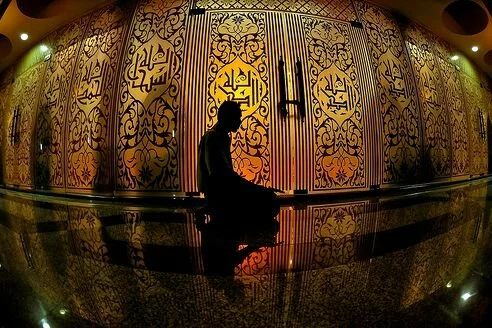
The general and preferred Sunnah of the Messenger of Allah (pbuh) was to dedicate himself to the worship and remembrance of the Lord in isolation in the masjid for a period in the month of Ramadan. In the year the Prophet (pbuh) died, he (pbuh) observed ‘itikaf’ for twenty days of Ramadan.
I`tikaf means ‘remaining’ somewhere.
In I’tikaf the bondsman cuts himself away from everything and throws himself at the threshold , or rather the feet oh his Lord and Creator. He remembers Him, exalts His name and offers earnest repentance to Him, cries over his sins and follies, entreats Him for mercy and forgiveness and seeks His countenance and propinquity. His days and nights are spent in that way.
I`tikaf is a means of great reward. It says in the Fatawa Hindiyya,
“Its excellence is obvious, for the one make such a spiritual retreat:
- Has submitted their entire person to the worship of Allah Most High;
- Seeks closeness;
- Distances themselves from the worldly distractions that prevent one from proximity;
- Drowning their entire time in actual or effective worship, for the basis of its legislation is to wait from one prayer time to the next prayer in congregation;
- It also makes the one is retreat resemble the angels who do not disobey the command of Allah and do what they are commanded, while glorifying Allah by night and day without tiring…” [1.212]
What to do during i`tikaf
One should busy oneself with the beneficial as much as one meaningfully can, such as:
1. Voluntary prayer,
2. Reciting the Book of Allah, with reflection, contemplation, and passion,
3. Remembrance of Allah, in all its forms,
4. Gaining beneficial knowledge, and listening to inspiring religious discourses (which is why it is wise to make i`tikaf in a mosque with people of learning, and good company to inspire one towards the good).
The following acts are permissible for one who is making I’tikaf:
(1) The Person may leave his place of I`tikaf to bid farewell to his wife and a woman can visit her husband who is in I`tikaf
(2) Combing and cutting one’s hair, clipping one’s nails, cleaning one’s body, wearing nice clothes or wearing perfume are all permissible
(3) The person may go out for some need that he must perform
(4) The person may eat, drink, and sleep in the mosque, and he should also keep it clean.
